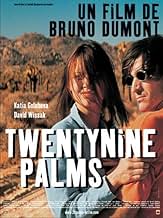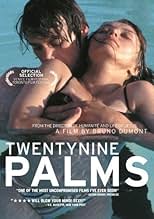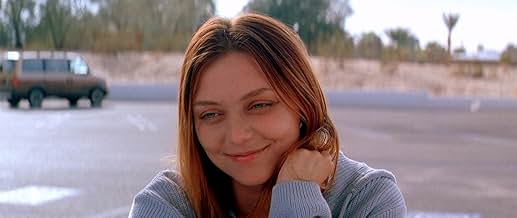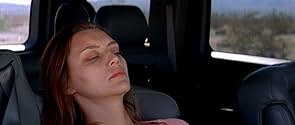IMDb-BEWERTUNG
5,1/10
5334
IHRE BEWERTUNG
Füge eine Handlung in deiner Sprache hinzuDavid, an American photographer, and his Russian girlfriend Katia are scouting locations for a photo shoot. During the day, they drive through some of the wildest, most bizarre desert landsc... Alles lesenDavid, an American photographer, and his Russian girlfriend Katia are scouting locations for a photo shoot. During the day, they drive through some of the wildest, most bizarre desert landscapes, but their luck begins to run out.David, an American photographer, and his Russian girlfriend Katia are scouting locations for a photo shoot. During the day, they drive through some of the wildest, most bizarre desert landscapes, but their luck begins to run out.
- Regie
- Drehbuch
- Hauptbesetzung
- Auszeichnungen
- 1 Gewinn & 2 Nominierungen insgesamt
Yekaterina Golubeva
- Katia
- (as Katia Golubeva)
Empfohlene Bewertungen
Just don't focus on this stuff people say that nothing happens for hours and that at the end there 'finally' is some violence. It's not true. A lot of things happen. And if nothing happens then you're just watching a wonderful shot.
Just don't focus all the time about what's coming next and what this and that could mean while watching a movie. Just relax and watch the movie. Lean back. It's about a couple. They're driving around in the desert (he's doing some location scouting for a photography job). They love, they hate, they fear each other. Sometimes they don't understand each other but everything seems to go along. They're driving along in this vast free desert. Alone it seems.
And did I mention you should relax when watching a movie? You can't talk to a screen, so why blame the movie?
Just don't focus all the time about what's coming next and what this and that could mean while watching a movie. Just relax and watch the movie. Lean back. It's about a couple. They're driving around in the desert (he's doing some location scouting for a photography job). They love, they hate, they fear each other. Sometimes they don't understand each other but everything seems to go along. They're driving along in this vast free desert. Alone it seems.
And did I mention you should relax when watching a movie? You can't talk to a screen, so why blame the movie?
While working in the California desert, French auteur Bruno Dumont (Flanders, Humanite, The Life Of Jesus) "suddenly became afraid." Thus blossomed Twentynine Palms, a mesmerizing, allegorical, terrifyingly unclassifiable foray into the Mojave and the problematic center of Yeats' The Second Coming.
Ostensibly, Palms is the story of an American photographer, David (David Wissak) and his European girlfriend, Katia (Yekaterina Golubeva of Leos Carax's Pola X) on assignment in the Joshua Tree desert. Hobbled by a Babelish communication barrier, their interaction limited to sex, and a mutual, rapidly disintegrating co-dependence, the couple is moving deeper into no-man's land on some kind of aimless and encroachingly sinister vision quest.
An exquisite road picture interspersed with long pockets of drifting, expansive dreaminess, Palms has moments of serenity and meditative calm. But make no mistake: it's moving closer to something awful in every frame, its sense of what's approaching disarmed rather than exacerbated by the landscape the opposite strategy of pictures like Peter Weir's Picnic At Hanging Rock, another brilliant nature film in which the natural world becomes oppressive and claustrophobic despite the freedom of sky and open spaces. The film benefits enormously from the perfect physical appearance of its leads: Wissak has alarming eyes and a face that seems to have disaster imprinted into it...one of the most brilliant achievements of the film is the way the faces of both leads keep fluctuating from dead to alive, without any noticeable outward changes in makeup or lighting.
The concept of Palms as a love story, as some have called it, falls hard. The film is loaded with sex intense, wailing, despairing sex that foreshadows in every way the horror that is to come at movie's end, though exactly what kind of a statement Dumont was trying to make with this remains unclear; one is inevitably moved to question his motives in the same way many questioned Gaspar Noe's in Irreversible (a film to which Palms has been infrequently compared). But Dumont's superb sense of artistry and restraint has noting is common with Noe's adolescent appropriation of philosophies too sophisticated for him and his fascination with cruelty and sadism cloaked in frantic & flashy concept art. Instead, Twentynine Palms presents us with the problem of evil accompanied by a sense of profound and deep sorrow, a mourning for a fate that may or may not be implied as inexorable, playing out under the unchanging beauty of land and sky.
Ostensibly, Palms is the story of an American photographer, David (David Wissak) and his European girlfriend, Katia (Yekaterina Golubeva of Leos Carax's Pola X) on assignment in the Joshua Tree desert. Hobbled by a Babelish communication barrier, their interaction limited to sex, and a mutual, rapidly disintegrating co-dependence, the couple is moving deeper into no-man's land on some kind of aimless and encroachingly sinister vision quest.
An exquisite road picture interspersed with long pockets of drifting, expansive dreaminess, Palms has moments of serenity and meditative calm. But make no mistake: it's moving closer to something awful in every frame, its sense of what's approaching disarmed rather than exacerbated by the landscape the opposite strategy of pictures like Peter Weir's Picnic At Hanging Rock, another brilliant nature film in which the natural world becomes oppressive and claustrophobic despite the freedom of sky and open spaces. The film benefits enormously from the perfect physical appearance of its leads: Wissak has alarming eyes and a face that seems to have disaster imprinted into it...one of the most brilliant achievements of the film is the way the faces of both leads keep fluctuating from dead to alive, without any noticeable outward changes in makeup or lighting.
The concept of Palms as a love story, as some have called it, falls hard. The film is loaded with sex intense, wailing, despairing sex that foreshadows in every way the horror that is to come at movie's end, though exactly what kind of a statement Dumont was trying to make with this remains unclear; one is inevitably moved to question his motives in the same way many questioned Gaspar Noe's in Irreversible (a film to which Palms has been infrequently compared). But Dumont's superb sense of artistry and restraint has noting is common with Noe's adolescent appropriation of philosophies too sophisticated for him and his fascination with cruelty and sadism cloaked in frantic & flashy concept art. Instead, Twentynine Palms presents us with the problem of evil accompanied by a sense of profound and deep sorrow, a mourning for a fate that may or may not be implied as inexorable, playing out under the unchanging beauty of land and sky.
A three-legged dog, a dead body lying naked in the middle of the desert, a cop on his walkie-talkie calling for backup and a road block miles from the nearest inhabitant. These and other bizarre things show up in Twentynine Palms, the latest film by Bruno Dumont (La Vie de Jesus, L'Humanite). It is essentially a horror film that might easily be called "Scream 4". The opening scenes are beautiful and serene. David (David Wassik), an independent photographer from Los Angeles, and Katia (Katia Golubeva), a young woman without work, travel in a red 4X4 Hummer toward the vast California desert preparing to do a photo shoot for a magazine near the Joshua Tree National Park. The road leads to a motel in the city of 29 Palms, a desert oasis that in the film consists of one gas station, one hotel, and a swimming pool. Dumont says that he filmed in the U.S. rather than his native France because he "
felt the need to change space, ingredients, colors... and it is while filming in California that I had a true shock". The shock extends to the viewer as well.
There is little dialogue or action in the conventional sense. The communication between the couple is complicated by the absence of a common language: he speaks English, she only speaks French. What conversation exists is trapped in a level of superficial banality. The lovers explore the desert in their 4X4 and are focused entirely upon their own pleasure, seemingly defined by their sexuality. They swim in the motel pool, watch game shows on television, eat, make love in the middle of the desert, eat some more, argue and make up, then make love some more, all shown in explicit detail. Everything is familiar, a slice of typical Americana, yet nothing is as it seems.
Little by little the milieu becomes oppressive; a quiet and incoherent fear begins to settle in, an abstract fear because as Dumont says, "there is no reason to be afraid." At the end, nothing can fill the emptiness but destruction. The contrast between the poetry of nature and the constricted range of the human experience is clear. In this world without a spiritual core, the screams of pain and screams of delight are indistinguishable and anguish has the same meaning as pleasure. According to Dumont, "There is at the same time the bliss of pure happiness and absolute horror, the capacity to generate the two extremes: the hyper violence and the hyper pleasure. This is a couple that lives for pure pleasure and that will be led into abomination."
One cannot be neutral about a Bruno Dumont film (many people walked out during the Vancouver showing). His audiences are polarized between those who love and those that detest his films and the director seems disinterested in reconciling the two. I found this film extremely difficult to watch and even harder to be emotionally engaged with the characters. Dumont tests our endurance with scenes of brutal violence, making no concession to our sensibilities. In bringing us face to face with our worst nightmare, however, he forces us out of our state of emotional detachment and compels us to react, not with our minds or even our hearts, but viscerally with the totality of our being. Far removed from the pre-digested package cinema of Hollywood, Dumont has made an important statement about American values. The question must be asked however -- with films like Twentynine Palms that are so off-putting, will there be anyone who notices?
There is little dialogue or action in the conventional sense. The communication between the couple is complicated by the absence of a common language: he speaks English, she only speaks French. What conversation exists is trapped in a level of superficial banality. The lovers explore the desert in their 4X4 and are focused entirely upon their own pleasure, seemingly defined by their sexuality. They swim in the motel pool, watch game shows on television, eat, make love in the middle of the desert, eat some more, argue and make up, then make love some more, all shown in explicit detail. Everything is familiar, a slice of typical Americana, yet nothing is as it seems.
Little by little the milieu becomes oppressive; a quiet and incoherent fear begins to settle in, an abstract fear because as Dumont says, "there is no reason to be afraid." At the end, nothing can fill the emptiness but destruction. The contrast between the poetry of nature and the constricted range of the human experience is clear. In this world without a spiritual core, the screams of pain and screams of delight are indistinguishable and anguish has the same meaning as pleasure. According to Dumont, "There is at the same time the bliss of pure happiness and absolute horror, the capacity to generate the two extremes: the hyper violence and the hyper pleasure. This is a couple that lives for pure pleasure and that will be led into abomination."
One cannot be neutral about a Bruno Dumont film (many people walked out during the Vancouver showing). His audiences are polarized between those who love and those that detest his films and the director seems disinterested in reconciling the two. I found this film extremely difficult to watch and even harder to be emotionally engaged with the characters. Dumont tests our endurance with scenes of brutal violence, making no concession to our sensibilities. In bringing us face to face with our worst nightmare, however, he forces us out of our state of emotional detachment and compels us to react, not with our minds or even our hearts, but viscerally with the totality of our being. Far removed from the pre-digested package cinema of Hollywood, Dumont has made an important statement about American values. The question must be asked however -- with films like Twentynine Palms that are so off-putting, will there be anyone who notices?
This film is about tragedy, rape, and murder. It is not a romantic film, it is not a horror film, it is just a film about the most depressing aspects and results of really bad consequences. It is a seriously messed up film. One that I only could stomach once. I mean, this film is sad stuff. It is well acted by the two leads, but to really grasp the nature of it, you're just going to have to watch it to see what I mean. To tell you anything about the climax would be ruining a very unwholesome and devastating experience. I couldn't even sleep after watching this. I can't say that it's just simply really disturbing. It hits way deeper than that. It's just, wow. It hits hard. I recommend it to people who are open minded about their films and about the possibilities of films like these.
Well this one definitely isn't for everyone, as you can tell by the comments. For awhile, I liked this movie. I kind of liked these two driving around in the desert. The movie had that sort of dreamlike Zabriskie Point thing going on. In fact, along those lines, I'd mention that the film did feel like something from the 1960s (in a good way).
Katia Golubeva is a pretty enough girl, and we see a lot of her.
I know from regular trips to Death Valley that Europeans have a special respect for American deserts. At Badwater Junction in Death Valley, you can walk out onto the salty flats and despite the fact that you're in a giant valley, they know enough to whisper, or remain silent altogether. It's a pensive respect for the desert I wish more Americans had.
Here, you get a lot of California desert; always a good thing (to me). I liked these two characters when they were getting along - there was a weird and charming sort of innocence in their sex life and affection for each other.
Didn't fully get why they were constantly sniping at one another or why they kept having falling outs with each other. And that seems to be important to the overall point of the film, and I'm still thinking about it. I wanted to slap them - especially David - when he was being a jerk.
Because you should *never* take a sexually liberated French girl naked in the desert for granted that way (Am I right?).
The end is jarring, and a metaphor for something but I'm not sure what, exactly. Something, I suspect, about the fact that the two characters should have been a little more tender and appreciated each other more (especially on the dude's part), what with all the meanness and cruelty in the world (and so on).
This is not for everyone. It is slow moving, beautiful to look at, with characters who occasionally charm and occasionally irritate. The end sequence is disturbing and unpleasant.
If you're a fan of mainstream Hollywood, you might find this excruciatingly boring. The pervasive quiet of the movie makes the end all the more startling.
This film was not an unqualified success, but there's a fair amount to like here, I think. For certain people, anyway.
Katia Golubeva is a pretty enough girl, and we see a lot of her.
I know from regular trips to Death Valley that Europeans have a special respect for American deserts. At Badwater Junction in Death Valley, you can walk out onto the salty flats and despite the fact that you're in a giant valley, they know enough to whisper, or remain silent altogether. It's a pensive respect for the desert I wish more Americans had.
Here, you get a lot of California desert; always a good thing (to me). I liked these two characters when they were getting along - there was a weird and charming sort of innocence in their sex life and affection for each other.
Didn't fully get why they were constantly sniping at one another or why they kept having falling outs with each other. And that seems to be important to the overall point of the film, and I'm still thinking about it. I wanted to slap them - especially David - when he was being a jerk.
Because you should *never* take a sexually liberated French girl naked in the desert for granted that way (Am I right?).
The end is jarring, and a metaphor for something but I'm not sure what, exactly. Something, I suspect, about the fact that the two characters should have been a little more tender and appreciated each other more (especially on the dude's part), what with all the meanness and cruelty in the world (and so on).
This is not for everyone. It is slow moving, beautiful to look at, with characters who occasionally charm and occasionally irritate. The end sequence is disturbing and unpleasant.
If you're a fan of mainstream Hollywood, you might find this excruciatingly boring. The pervasive quiet of the movie makes the end all the more startling.
This film was not an unqualified success, but there's a fair amount to like here, I think. For certain people, anyway.
Wusstest du schon
- WissenswertesCasting Director Elisabeth Jereski originally planned to cast Marine Corporal Joshua James in the lead, but was rebuffed by his local Squadron Commander, Lt. Col. F.J. Usry, as the graphic sex scenes and violence would portray the Marine Corps, with which James was actively serving in 29 Palms, in a "less than positive light in the community."
- SoundtracksAkata Sun Dunchi
Performed by Takashi Hirayasu and Bob Brozman
Written by Takashi Hirayasu
Instrumental arrangements by Takashi Hirayasu and Bob Brozman
Published worldwide by Riverboat (UK) Music
Under license from World Music Network
Top-Auswahl
Melde dich zum Bewerten an und greife auf die Watchlist für personalisierte Empfehlungen zu.
- How long is Twentynine Palms?Powered by Alexa
Details
- Erscheinungsdatum
- Herkunftsländer
- Offizielle Standorte
- Sprachen
- Auch bekannt als
- 29 palmas - Pasiones salvajes
- Drehorte
- Produktionsfirmen
- Weitere beteiligte Unternehmen bei IMDbPro anzeigen
Box Office
- Bruttoertrag in den USA und Kanada
- 54.523 $
- Eröffnungswochenende in den USA und in Kanada
- 12.870 $
- 11. Apr. 2004
- Weltweiter Bruttoertrag
- 167.999 $
Zu dieser Seite beitragen
Bearbeitung vorschlagen oder fehlenden Inhalt hinzufügen





















